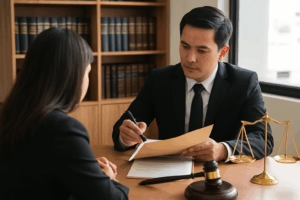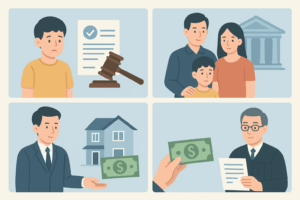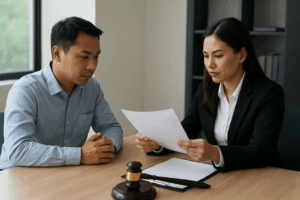A Comprehensive Guide to Litigation in Thailand
Navigating the legal waters of any country is crucial, and understanding litigation in Thailand, with its distinct legal system and rich cultural heritage, is no exception. Whether you’re considering pursuing legal remedies in Thailand or are already involved in one, having a deeper insight into how litigation in Thailand operates can be invaluable.
1. The Structure of Thai Courts: An Overview
Court of First Instance
Every litigation journey in Thailand starts here. Whether you’re filing a civil or criminal case, this is your starting point. The Court of First Instance is primarily concerned with hearing cases for the first time, examining evidence, and delivering verdicts.
Court of Appeal
If a party is dissatisfied with the judgment rendered by the Court of First Instance, the case can be taken up to the Court of Appeal. Here, the proceedings primarily focus on reviewing the first court’s judgment based on the evidence presented previously. New evidence is rarely introduced.
Supreme Court
This is Thailand’s apex court. Cases reaching this level undergo the most rigorous scrutiny. While judgments from this court are final, it’s essential to note that not every case can ascend to the Supreme Court. Typically, only matters of significant legal importance or those involving substantial legal ambiguities reach this level.
2. The Specialized Courts of Thailand
These courts cater to niche areas that require specialized knowledge:
– Labor Court: Deals with disputes between employers and employees.
– Tax Court: Handles tax-related cases, such as those concerning evasion or misunderstandings of tax laws.
– Intellectual Property and International Trade Court: This court manages matters related to patents, trademarks, copyrights, and international business disputes.
– Bankruptcy Court: Concerned with cases where individuals or businesses cannot meet their financial obligations.
It’s essential to choose the appropriate court for your case to ensure that your matter is handled by experts in that particular field.
3. Thai Judgments: The Emphasis on Written Decisions
Oral delivery of judgments is rare in Thailand. Instead, judges offer detailed written judgments. This approach brings transparency and clarity, allowing the parties involved (and their lawyers) to understand the reasons behind every decision and the interpretation of laws.
4. The Significance of Written Evidence
Thailand places a considerable emphasis on documented evidence. While witness testimonies are part and parcel of the proceedings, written evidence often holds more weight. Comprehensive documentation, therefore, is a crucial aspect of Thai litigation.
5. Jury Trials: A Western Concept Absent in Thailand
Unlike some western countries, Thai courts don’t operate with juries. Judges, with their legal expertise, are entrusted with the responsibility of making decisions on both facts and legal interpretations. This structure ensures that verdicts are based solely on legal merit and the evidence at hand.
6. Time Considerations in Thai Legal Proceedings
Legal processes anywhere can be time-consuming, but in Thailand, patience is essential. Especially when dealing with complex cases, you might have to wait several years before the court delivers a final verdict. Preparing for such eventualities, both mentally and financially, is essential.
7. Mediation: An Encouraged Approach
Before deep-diving into litigation, Thai courts often promote mediation. This approach not only saves time and resources but also fosters amicable relations between parties. It’s common for judges to recommend parties try and settle matters outside the court, thereby reducing the court’s caseload and the emotional and financial strain on the parties involved.
8. Foreign Judgments in Thai Courts
Thailand, in general, does not recognize or enforce foreign judgments. However, these can still hold persuasive value and might serve as the basis for initiating a new case in the country.
9. Language Protocols in Court
The Thai language dominates court proceedings. If you’re presenting foreign documents as evidence, ensure they’re translated into Thai. Additionally, these translations must be certified for authenticity.
10. Statutes of Limitations: Timeframes to Watch
Depending on the nature of the claim, Thailand has varied limitation periods. For instance, breach of contract claims might have a different duration than personal injury claims. Being aware of these timelines is essential to ensure that you don’t forfeit your rights due to procedural delays.
11. Representation in Thai Courts
Only those licensed in Thailand can represent parties in Thai courts. While foreign lawyers can provide consultations and advice, when it comes to actual court representation, only Thai-licensed lawyers are authorized.
12. Bail Procedures
Thailand’s bail procedures can sometimes surprise those familiar with Western systems. Even in civil cases, there’s a possibility of detention, particularly if there’s a risk of a party fleeing the country. In such scenarios, posting bail becomes a priority.
13. Navigating Court Fees
Based on the claim’s value, court fees are calculated. However, to prevent exorbitant costs for high-value claims, there’s a cap in place.
Conclusion
The Thai legal system, with its unique characteristics, requires a clear understanding and strategic approach. Whether you’re a local or a foreigner, when embarking on legal disputes in Thailand, consulting with a proficient local attorney is not just recommended; it’s imperative. Such professionals will guide you through the intricacies, ensuring that your rights are protected and your case is presented in the best possible light.
Contact : Siam Center Law Group by calling +66(0) 2 648 5041, +66(0) 2 648 5042





